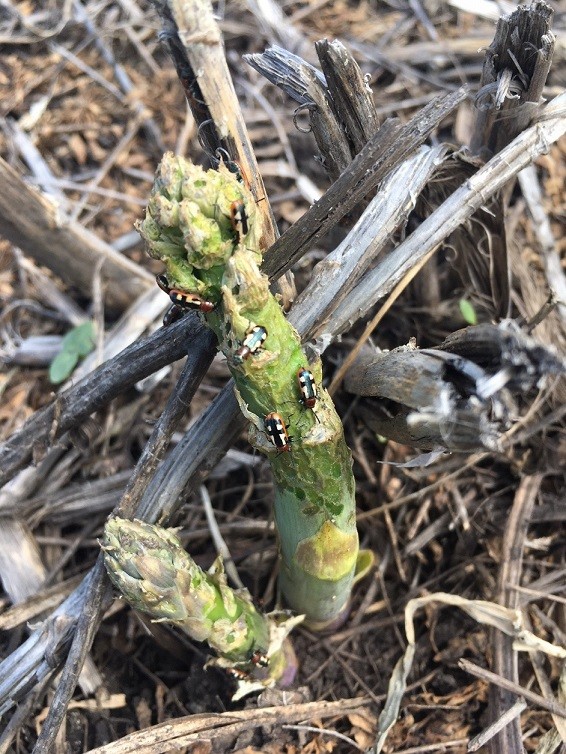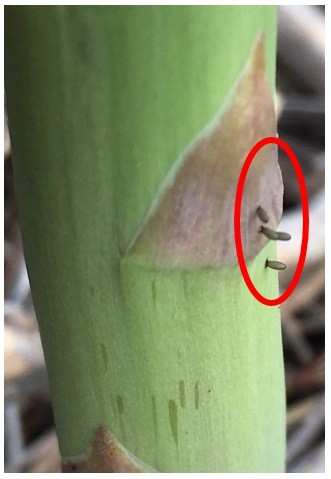Common Asparagus Beetle Management During Harvest Season
Ethan Grundberg, Vegetable Specialist
Eastern New York Commercial Horticulture
The beginning stages of Common asparagus beetle (Crioceris asparagiI) infestations often go unnoticed. Since the beetles have two to three generations per year (depending upon where you are in our region), the population can build quickly over the course of a couple of years and catch growers off-guard at harvest.
Overwintered adults emerge from their pupae about the same time that asparagus spears begin to push. They quickly begin to feed on the tender shoots causing a sort of rasping damage that browns quickly in the field or post-harvest. The beetles then mate and deposit their eggs in vertical lines along the spears as shown in the image. After about a week, those eggs hatch into small grubs that continue to feed on spears before pupating in the soil.
Though the larvae, not adults, are most susceptible to insecticides, growers experiencing significant early damage (the economic threshold is suggested to be when 5%-10% of spears have adults present) may need to use an insecticide to knock down the adults before targeting larvae and later generations on ferns. Given the need to continue harvesting every 1-2 days (a practice that also helps remove eggs from the field to slow the population growth), a short Pre-Harvest Interval (PHI) and Restricted Entry Interval (REI) are key to selecting an appropriate labeled insecticide.
The standard insecticide options are pyrethroids (IRAC Group 3A), such as Pounce 25 WP and other labeled permethrin formulations (1 day PHI, 12 hour REI) or PyGanic 5.0 (OMRI, 0 day PHI, 12 hour REI). Some neonicitnoids (IRAC Group 4A), such as Assail 70 WP and Anarchy 30 SG (both acetamiprid), are also labeled for asparagus beetle adults and larvae during harvest (1 day PHI, 12 hour REI). Lannate (methomyl, IRAC Group 1A), is also options if you are willing to equip the harvest crew with early entry PPE (1 day PHI, 48 hour REI) to continue removing egg masses on cut spears. An easier option for those looking to use an organophosphate is Sevin XLR Plus (carbaryl, 1 day PHI, 12 hour REI). Note that Lorsban (chlorpyrifos) is sometimes recommended in other states, but IS NOT allowed for use on asparagus in New York.
For heavily infested fields, continue scouting the asparagus after harvest and target second and/or third generations with any of the options listed above or with IRAC Group 5 spinosyns, such as Radiant or Entrust (OMRI), both of which have a 60 day PHI. Cleaning fields of old stalks after mowing in the fall can also help reduce the overwintering populations.
 1. Common asparagus beetle adults feeding on an emerging spear
1. Common asparagus beetle adults feeding on an emerging spear 2. Grayish colored asparagus beetle eggs visible in a vertical line on a young spear
2. Grayish colored asparagus beetle eggs visible in a vertical line on a young spear
Upcoming Events
Vegetable Field Meetings with Dr. Steve Reiners
July 14, 2025 : Herkimer County - Ivan Martin's Farm
Herkimer, NY
Topics: Tomato Fertility and Mitigating Physiological Disorders; Pest Scouting, ID, and IPM Field Walk.
July 15, 2025 : Washington County - Hand Melon Farm
Greenwich, NY
Topics: Tomato Fertility and Mitigating Physiological Disorders, Tomato and Sweet Corn IPM; FSMA Water Assessments and Postharvest Sanitation
July 16, 2025 : Ulster County - Wallkill View Farm
New Paultz, NY
Topics: Tomato Fertility and Mitigating Physiological Disorders; Veg Pest Update and Management; Cornell Tomato Breeding Program and Slicer Tomato Variety Trial Tour
2025 Berry Twilight Meetings
July 2, 2025 : Berry Twilight Meeting at Dressel Farms
New Paltz, NY
Join Heather Kase, CCE ENYCHP, and Anna Wallis, Cornell IPM, for seasonal updates on berry pest man-agement and IPM.
July 16, 2025 : Berry Twilight Meeting at Samascott Orchards
Kinderhook, NY
Join Heather Kase, CCE ENYCHP, and Anna Wallis, Cornell IPM, for seasonal updates on berry pest man-agement and IPM.
August 6, 2025 : Berry Twilight Meeting at Fishkill Farms
Hopewell Junction, NY
Join Heather Kase, CCE ENYCHP, and Anna Wallis, Cornell IPM, for seasonal updates on berry pest man-agement and IPM.
Champlain Valley Orchard Field Afternoon
July 17, 2025 : Champlain Valley Orchard Field Afternoon
Chazy, NY
This July ENYCHP will be hosting an orchard field afternoon highlighting Mike's research trials at Chazy Orchards.












































